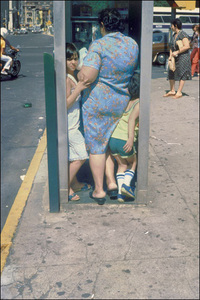Unlike most critics of my acquaintance, I like language with a cheap and gaudy gleam. When that gleam is gone, it’s easily replaced, especially by cliches of a bygone era. They rise from the dead as if they’d been to a spa and step up to serve a new age as shining examples of their time and place.
Pushing up daisies. Kick the bucket. Take the fall. Turn a blind eye. Hitch my wagon to your star. All over him like a cheap suit.
Stuffed in a phone booth.
(Image left, Helen Levitt, click to enlarge.)
What makes a cliche? Just use by the many? If everybody sang, “Will you still need me, will you still feed me” at once, would it be finished? Why doesn’t the same principle apply to prayers?
For Martin Amis (who wrote a book on the subject), cliches are empty husks.
In a Charlie Rose interview on YouTube, Amis objected to “moldering novelties” such as…
seen it, done it; got the T-shirt; he went ballistic; I don’t think so, and HELLO. These are dead words. These are herd words.
I don’t agree with Amis about cliches in language (depends on how they’re used, not what they are), but his reasoning is unarguably wrong in art. Art recycles the comatose into the lively. The visual equivalent of herd speak is interesting precisely because it’s herd speak.
(Joseph Mills right, click to enlarge.)
What could be more ordinary than a slide?
As far as Amis’ dread HELLO goes, Jeffry Mitchell is the answer. (Click image to enlarge. Via Port.)






Banality to me is any drawing or painting with a bunny, a puppy, or a mountain stream in it. Dreck!
“These are dead words. These are herd words” Absolutely not! If anything, these are real living words in use infinite times a second all over the place. However, these might be words not to be paid attention to. Maybe a cliche’s job is to “fall by the wayside” into a kind a banality caused by constant use (concentrated overuse might be the hallmark of the “bad” cliche–I’ve heard “TMI!” way too much this winter) and become refreshed again by some kind of nostalgic revival or cultural phenomenon, or in art. I’m actually getting pissed off re-reading Amis statement. All words are “herd” words, that’s how language works, enabling the herd to communicate.